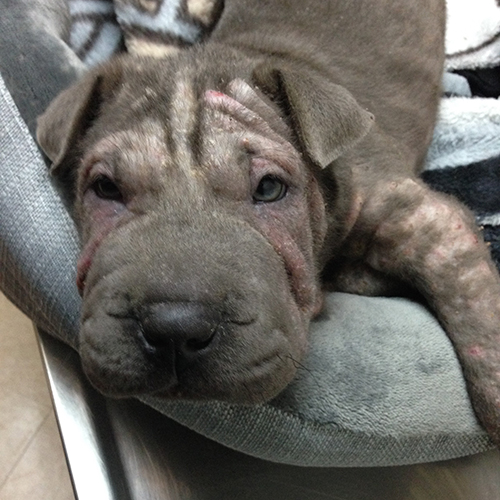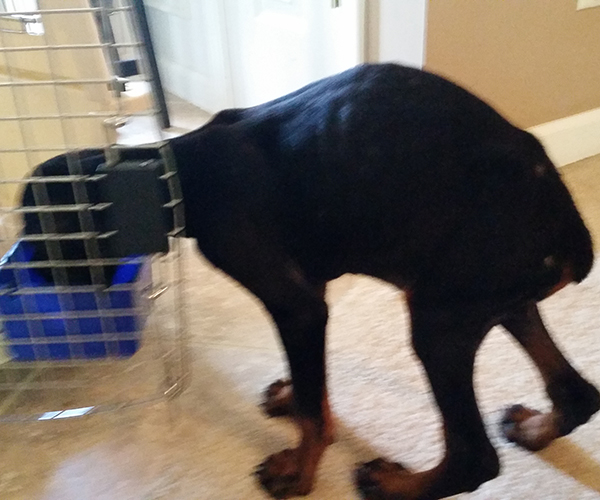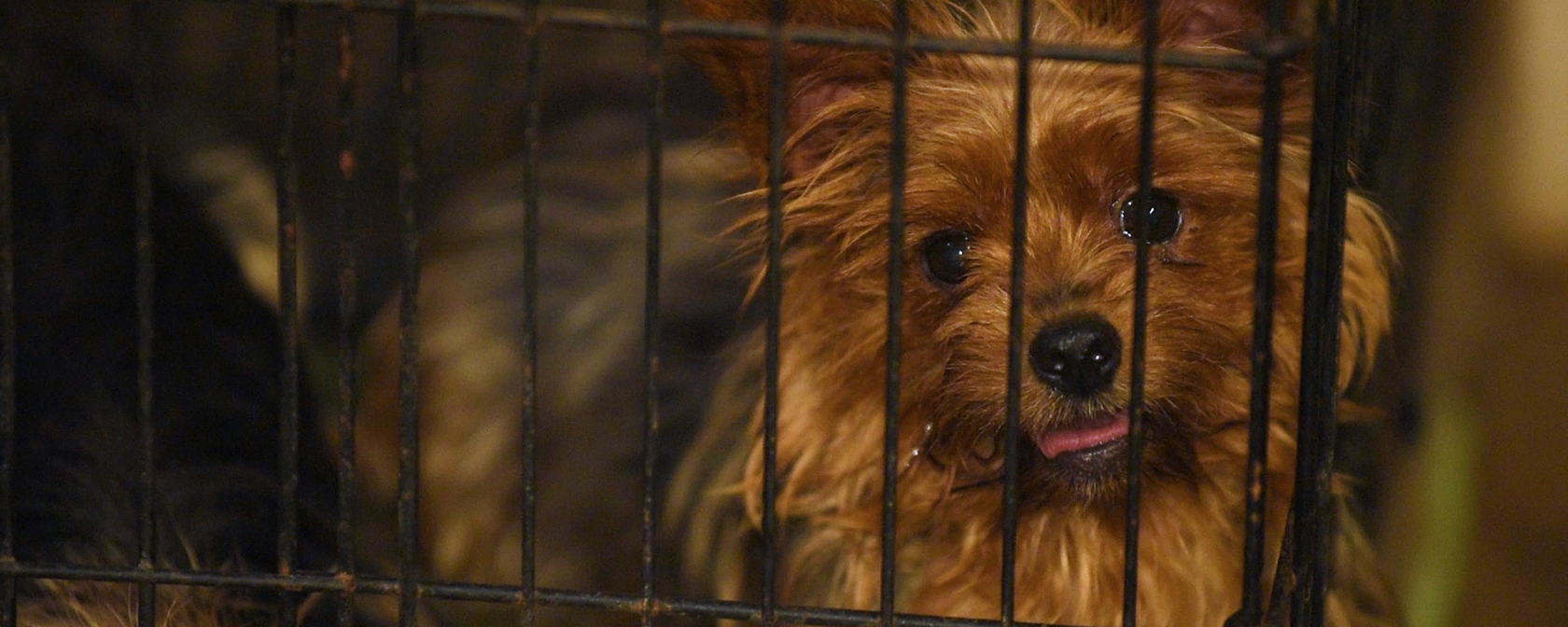By Sara Amundson and Kitty Block
When Jaqueline Villegas met her family’s new puppy at Denver International Airport, she knew right away the puppy was not the healthy Shar-Pei she had seen on PuppyFind.com, a huge online marketplace for puppies with over 50,000 puppies listed for sale. PuppyFind is also a site that the Humane Society of the United States has repeatedly linked to puppy mills.
The puppy in the airline crate, whom Ms. Villegas named Maddie, had sores on her face and very little hair on her body. It was clear the puppy was sick and had been abused or neglected—she was shaking in fear. When Ms. Villegas removed Maddie from the crate, she had difficulty walking and there was a bad odor coming from the little dog. As Villegas got the poor puppy settled into her car, she called her husband to tell him that Maddie had arrived in terrible condition. And since the puppy was a Christmas present for their 5-year-old son, they discussed how to explain to him that Santa had brought the family a sick puppy who could barely walk.

Deborah Britt also unwittingly purchased a very sick Shar-Pei puppy she found on PuppyFind. Ms. Britt’s puppy, whom she named Jai-Li, was nothing like the puppy pictured in the listing she responded to. When Ms. Britt received Jai-Li, he had a severe upper respiratory infection and worms. A veterinarian treated him for those conditions, but the puppy soon became lethargic and then stopped eating. Before further treatment could be tried, Jai-Li’s condition worsened. He started having difficulty breathing and began bleeding from the nose. The veterinarian at the emergency hospital told Ms. Britt the puppy’s lungs were filling with blood. On the veterinarian’s recommendation, Ms. Britt made the difficult and humane decision to have Jai-Li euthanized—just two weeks after she had purchased him from a breeder selling puppies on PuppyFind.com.
Ms. Villegas and Ms. Britt are two of eight plaintiffs who sued PuppyFind in a case that settled out of court this week. Attorneys in the HSUS’s Animal Protection Law department represented the plaintiffs alongside the Arizona firm, Burch & Cracchiolo, P.A. It has been an arduous but important fight because online sellers have been mistreating dogs and causing consumers heartache for too long.
The suit alleged that PuppyFind systematically deleted negative reviews of sellers and created and displayed false, high seller ratings, leading consumers to believe they were seeing listings from reputable breeders with whom other buyers had positive experiences. In fact, the suit alleged, the sellers of the plaintiffs’ puppies were known puppy millers George and Tabitha Doyle, whose Tennessee facility was raided by law enforcement last year, leading to charges of 338 counts of animal cruelty. The Doyles had been selling puppies on PuppyFind for years, according to the suit. Ms. Doyle was convicted of 47 counts of animal cruelty in 2000. Neither the plaintiffs nor any other users browsing the site had any hint of this, though, because PuppyFind had removed all 148 negative reviews and low star ratings submitted for the seller, many of which expressly warned consumers about the Doyles’ sordid past, that they were still running a puppy mill and that buyers should not purchase from them.
Daphne, a puppy purchased through PuppyFind.com, arrived extremely thin. Daphne managed to survive her rough start in life, but has a lasting extreme fear of crates and is much smaller than she should be.

Sadly, the Doyles are not the only unscrupulous sellers who have sold puppies by advertising on PuppyFind, or elsewhere online. Many of the breeders advertising on PuppyFind are puppy mills where dogs live in squalor, and are often confined in stacked wire cages and denied basic veterinary care with little to no human interaction. Many of the problematic breeders who have appeared in the annual Horrible Hundred report over the years regularly sell on PuppyFind. The HSUS routinely hears sad stories from consumers who purchased sick puppies through PuppyFind or other online marketplaces or sellers.
Following PuppyFind’s numerous unsuccessful attempts at dismissal, the case was set to go to trial in October. In light of this prospect, the parties have settled the case and PuppyFind has agreed to change several of its practices and its website, including its review and ratings system, which the plaintiffs alleged was highly misleading. In addition to paying monetary compensation to the plaintiffs, PuppyFind will no longer remove negative seller reviews based merely on a seller’s “request” that it do so, and it will cease its policy of removing negative reviews containing statements of “opinion.” PuppyFind has also agreed to require sellers to indicate whether they are licensed by the USDA or a state agency, and sellers who provide PuppyFind with government identification will be designated as “verified sellers.” PuppyFind has also agreed to investigate allegations that a seller has engaged in animal cruelty and remove the account if the allegations are verified.
This lawsuit should be a warning to deceptive online puppy sellers and marketplace sites that support them that they cannot hide. These concessions by PuppyFind will help puppy buyers avoid some of the same sad outcomes experienced by the plaintiffs in this case and their puppies, but the lawsuit remains a cautionary tale to anyone considering purchasing a puppy online. It is best to adopt a dog from a shelter or rescue organization, or if you are going to purchase from a breeder, buy directly from reputable breeders that you have visited in person, rather than online or through pet stores. Responsible breeders want to meet the people who are taking home their puppies, and puppies are safer when they aren’t shipped long distances to pet stores or online buyers.
Thankfully, Maddie, that pup who arrived for Christmas and could barely walk, pulled through her ordeal. She is now 7 years old and in good health. But Maddie still bears the signs of her origins: She must be kept on a daily allergy medication and suffers from a chronic ear infection that still requires managing from her family.
We will continue to fight until puppy mills are a thing of the past, including through legal action like this lawsuit. Now, 400 localities and five states have ended or restricted the sale of commercially raised puppies in pet stores, the most recent state being Illinois. On the federal level, the Puppy Protection Act would produce significant upgrades to the Animal Welfare Act, requiring prompt professional veterinary care, prohibiting keeping dogs in stacked cages with wire floors and requiring more room for dogs to run and play. To help spare dogs from the misery of puppy mill life, ask your representatives in Congress to support the Puppy Protection Act.
Kitty Block is President and CEO of the Humane Society of the United States.




